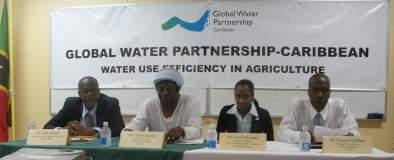The workshop’s opening ceremony included remarks from Ms. Avril Alexander, Regional Coordinator of GWP-C; Mr. Cromwell Williams, Manager/ Water Engineer of the St. Kitts Water Services Department; and Mr. Ashton Stanley, Permanent Secretary of the Ministry of Agriculture.
Mr. Cromwell in his remarks, stressed that there should be cohesion in the management of water and agriculture. He highlighted the need for great investments to meet the increase demand for water identified by the agriculture sector in St. Kitts and sited Integrated Water Resources Management (IWRM) as the approach for addressing the various demands by sectors. He also stressed the critical importance of farmers and all other users to work to conserve water. He explained that from an environmental standpoint there is great water stress during the dry season and from an economical viewpoint, demand management reduced the need for increasing investment.
Mr. Ashton Stanley, Permanent Secretary of the Ministry of Agriculture, expressed that the WUE workshop was timely, citing the experiences of the Ministry in recommending water management methods to farmers, explaining that they are not always followed. He further pointed out that there has been an increase in the demand for water from other sectors (E.g. Tourism).
Mr. Stanley explained to participants that there is no policy on water for agriculture in St. Kitts and the fact that there is need for a national consultation on this to develop a plan/policy. He also acknowledged the need for IWRM, stating that the responsibility of securing water for agriculture does not rest solely on the agriculture sector.
The three-day workshop targeted technicians and practitioners within the Agriculture sector and sought to train them and provide them with relevant material that could be used in working towards improved water use efficiency in the sector. St. Kitts was seen as an ideal territory to host the workshop as it is currently in the process of developing plans for the rationalisation of its water resources mainly with respect to water to be provided for agricultural development.
Workshop participants were trained on Water Use Efficiency (WUE) in Agriculture using the WUE Manual developed by GWP-C. The workshop facilitators Dr. Leslie Simpson, Natural Resources Management Specialist at CARDI and Mr. Stanley Rampair, a Senior Irrigation Consultant, clearly identified the objectives of the training to participants from the onset of the workshop.
The workshop objectives were clearly defined as follows:
- Demonstrate the benefits of improved WUE.
- Provide examples of demand calculation models for WUE in the agriculture sector.
- Demonstrate the methodologies for assessing the economic benefits of improved WUE.
- Explain the potential impacts of climate change on water resources use in the sector.
- Initiate discussions which would make provisions for the adaptation of WUE measures.
- Foster discussions on retrofitting the industry with WUE devices.
Apart from lectures with allotted discussion sessions, the workshop was designed in an interactive way with various exercises to reinforce key points and concepts. The broad topics covered included:
- Soil / Water Relationships
- Irrigation
- Water Efficiency
- Water Management and Non-Performance of Irrigation Systems
Participants were very receptive to the exercises which stimulated much discussion and debate and by extension allowed practitioners to share knowledge with each other on their experiences with WUE techniques for Agriculture.
Workshop participants included extension officers from the Ministry of Agriculture, officers of the Water Services Agencies as well as farmers from both St. Kitts and Nevis. Participants were all awarded certificates of participation after completing the three-day workshop.
